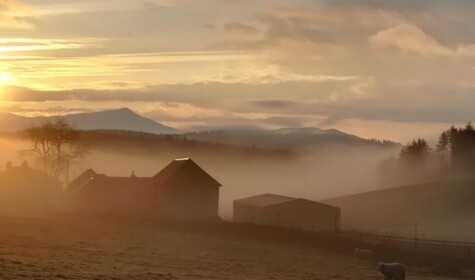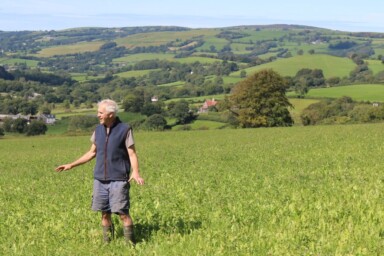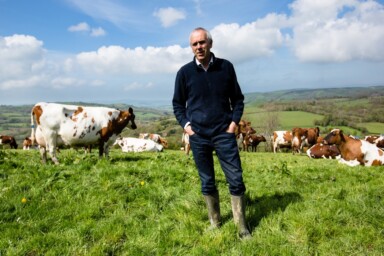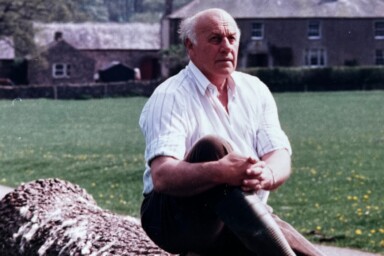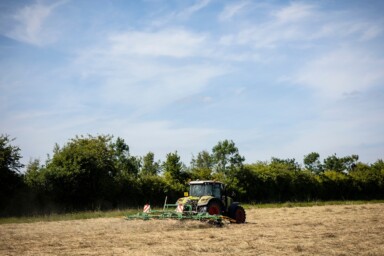What next for British agriculture: Farmers and food businesses reflect on Brexit
With only a few months remaining before our scheduled departure from the European Union, Brexit is looming large on the horizon. As talk of transition, hard borders and ‘no-deal’ spreads, we wanted to find out how farmers and food businesses across the country were feeling about the future of UK agriculture. What threats and opportunities do they see? Has their perspective changed since 2016? What specific issues are their businesses facing, and what has the UK Government done to address those concerns? We’ve invited farmers across the UK, to share their thoughts.
 This week, we speak to Andrew and Seonag Barbour, whose 540-hectare farm, Mains of Fincastle, in the Scottish uplands is home to a herd of 50 suckler cows and about 400 sheep. The farm is a few miles to the north west of Pitlochry and sits at over 1000 feet above sea-level. Eighty percent of the farm is under rough grazing, which is classified under the Natura 2000 designations, thanks to the underlying limestone and associated plant communities.
This week, we speak to Andrew and Seonag Barbour, whose 540-hectare farm, Mains of Fincastle, in the Scottish uplands is home to a herd of 50 suckler cows and about 400 sheep. The farm is a few miles to the north west of Pitlochry and sits at over 1000 feet above sea-level. Eighty percent of the farm is under rough grazing, which is classified under the Natura 2000 designations, thanks to the underlying limestone and associated plant communities.
“We don’t know what Brexit means for us. Uncertainty is the name of the game. So, is the glass half full or half empty for us folks farming in the uplands? The glass is not just empty but broken to boot; it is the vision of a trade deal with the US letting in food with low standards of production. This is clearly a Trump aim and part of Mr Fox’s vision for Brexit. It’s unlikely we will survive that nightmare scenario as livestock producers in Highland Perthshire. Throw in austerity at home and we might as well retire now. Cheap food comes at a price.

That’s the gloomy view. But could the uplands light up with Brexit sunshine? On the face of it, the new Agriculture Bill could be good news for us, working extensive livestock systems in semi-natural habitats, where a wide range of native grasses and herbs are maintained by livestock grazing – ‘high nature value’ farming as some call it. But what depresses us is that, once again, the environment is seen as something separate from production with all the likely perverse consequences that this way of thinking brings – commercial food production may concentrate and intensify in the low ground areas where it can survive without support, leaving the uplands to be ‘rewilded’, abandoned in the delivery of other ‘public goods’ that don’t require active farming.
Brexit does offer the opportunity to reshape farming support, to build a more resilient, ecologically-sound farming sector, but it doesn’t look like we are heading there, from what Mr Gove says. We made changes some years ago to run a more extensive system than we previously did, which fits in with the environmental management issues. So, we are in theory well placed to deliver on Gove’s agenda. We are constantly trying to improve efficiency, and we are trialling a selection for more single lambs (this is achieved by putting the rams out later when the ewes are in poorer condition and less likely to bear twins) in response to concerns about the collapse of the lamb market.

However, the UK isn’t a unitary state when it comes to farming support, though it is regarding trade policy. What path will the devolved administrations follow (or be allowed to follow)? Our hope is that here in Scotland a more enlightened approach might be taken, one based on a sound food policy which then informs a land-use policy. But we are not holding our breath.”
Sustainable Food Trust’s reaction
The question of the uplands remains a significant one. We want to see thriving local economies across Less Favoured Areas where farmers can produce food sustainably and profitably. Uplands gather more than 70% of our drinking water, store billions of tons of carbon in peat and soils and are home to some of our most special wildlife. Through the continuation of traditional farming practices, upland farmers can deliver vital environmental outcomes – such as sequestering carbon, increasing the water holding capacity of upland areas which protects lowland towns from flooding and restoring habitat loss for critical populations such as bees. These public goods should be supported through public money, not as a replacement of farming income, but as an augmentation of it.

What’s more, we want the Government to acknowledge the value of farming in harmony with nature, particularly in the uplands, which are often cited as areas to be rewilded. The abandonment of food production in areas like the uplands, in favour of ‘land-sparing’, wouldn’t ultimately result in more sustainable agricultural practice overall, since remaining land (in the lowlands) would be pushed towards more intensive methods of production to meet the gap in yield. Instead of such a piecemeal approach to land use, in which food factories exist alongside nature parks, we want to see a genuine whole-farm approach where land is manged holistically and natural capital is improved.
For livestock producers in the uplands, access to local abattoirs is essential. Small abattoirs provide a food hub for local meat by providing a service to farmers who depend on them for processing all or part of their stock. Parts of the country, many in the upland areas, are already without a local abattoir and if the decline is allowed to continue, the supply of local, fully traceable meat will dry up.
 The threat posed by a free trade deal with the US is faced by all farmers but will be most keenly felt by livestock producers in the upland regions if the deal allows for cheap meat produced to a lower standard to flood the UK market. Such a move could potentially be disastrous for UK farmers, for animal welfare and for the environment, as well as failing to meet the expectations of the British public. Whether it’s hormone-treated beef or chlorine-washed chicken, there needs to be adequate checks and balances in place to guarantee that any trade deal with the US maintains the highest standards. We feel that it is essential for the SFT as a member of civil society to raise questions over regulatory standards, in order to ensure that a future US trade deal remains fair and safe. We cannot allow imported food that has been produced to a lower standard to undercut the economic viability of UK farmers and generate a race to the bottom.
The threat posed by a free trade deal with the US is faced by all farmers but will be most keenly felt by livestock producers in the upland regions if the deal allows for cheap meat produced to a lower standard to flood the UK market. Such a move could potentially be disastrous for UK farmers, for animal welfare and for the environment, as well as failing to meet the expectations of the British public. Whether it’s hormone-treated beef or chlorine-washed chicken, there needs to be adequate checks and balances in place to guarantee that any trade deal with the US maintains the highest standards. We feel that it is essential for the SFT as a member of civil society to raise questions over regulatory standards, in order to ensure that a future US trade deal remains fair and safe. We cannot allow imported food that has been produced to a lower standard to undercut the economic viability of UK farmers and generate a race to the bottom.
This series is not meant to endorse particular businesses or farms, but rather seeks to offer a variety of perspectives on the impact of Brexit on agriculture and the food supply chain.
